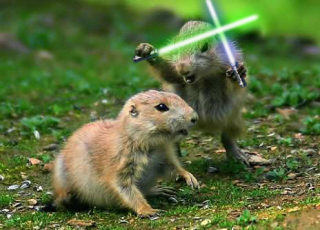
What would you say if I suggested that we step outside and have a conflict? When I ask people to tell me what they think of the minute I mention the word "conflict," they say: argue, combat, confrontation, disagreement, fight, resistance, tension, threat, violence, warfare, etc. Many of these words are negative.
Why are our first thoughts so negative? I think it is because we have handled so many "disagreements" badly in the past. The media influences us too. We see characters on the screen put each other down, yell, and scream, throw things, and often lose control turning violent. A lot of damage results from many conflicts we have witnessed. No wonder then we try to avoid conflicts or dread those that lie ahead.
Is it possible instead to view conflicts positively? Could we look forward to them? We have to overcome our bias and previous experiences and realize that nothing changes if we don't do something. The only way to improve a situation is to confront it. If an issue or problem is resolved to our satisfaction, we are glad we tackled it and feel more positive about the other person and our relationship. Of course just confronting another alone is not the answer. We need to approach them and the problem in a way that results in mutually satisfying outcomes. We need to learn new, different, and more effective ways to confront others.
(Picture by JoshuaSearls55)


In response I'd like to ask a question. Could the reason people think so negatively of conflict with others portray how they interpret conflict internally?
ReplyDeleteIn other words, conflict within oneself remains a private matter that often bores feelings of anxiety, stress, confusion and invalidation hence creating said relationship. To that same population, conflict with others is filtered through the same lense; conflict = negative internal reaction.
Now let's imagine people openly and honestly discussing their feelings, personal struggles, fears, and triggers; offering each other ideas about how to deal with, cope with, bypass or overcome life's greatest challenges. Sharing personal experiences about those things that are stigmatized as weak, shameful, and private in reference to inner conflicts would shine new light on the concept as a whole. Redefining conflict within oneself would in turn ripple out toward dealings with others; conflict = an opportunity for a resolve and learning experience.
Just some thoughts...
Anca, I can truly see what you are saying. I feel that way in many respects. I think I suffer more from intrapersonal conflict. Meaning I find myself in conflict more with myself than others. I avoid interpersonal conflict unless I feel very strongly about something. I think partially because of the way I was raised; in that conflict always escalted and I was truly a peacekeeper in the family. Which in it's own rights is one way to deal with conflict. But in making the peace and having everyone else feel better, I learned to bury my own feelings and thoughts on the issue. Additionally, I feel I gave up way too much of myself..if that makes any sense.
ReplyDeleteI am the living example of walking the fence. I can see both sides so clearly; even when it's something I want/need/desire I can see the other side of why I shouldn't. I swear I am not a mutiple personality! However, my internal conflicts are much worse (in emotional duress)than any other interpersonal conflicts I have.
Lori